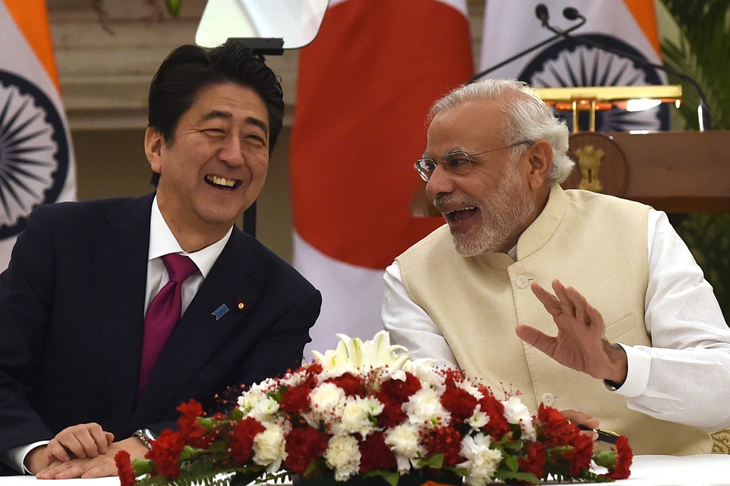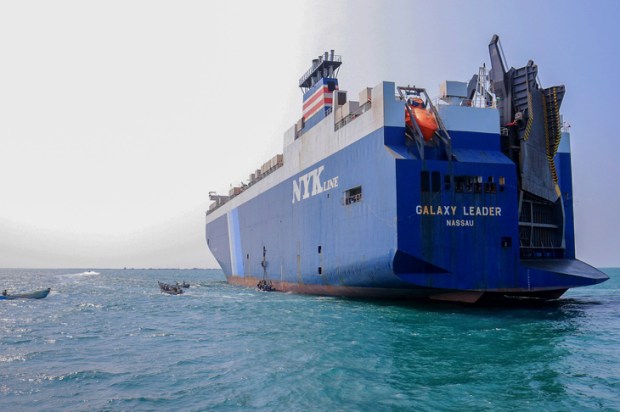Shinzo Abe’s domestic legacy will be overshadowed by his transformative foreign and security policies that repositioned Japan as an active regional player. For an Australian of Indian origin Abe will also be remembered as the godfather of the Indo-Pacific construct that helped integrate India into an open and free region spanning two oceans to the east and west of Australia.
Abe was political royalty. His maternal grandfather, Nobusuke Kishi, barely escaped trial as a war criminal for his role in China’s wartime occupation, yet he served as prime minister (1957–60) and was Japan’s first PM to visit India in 1957. In his book Utsukushii Kuni E (Towards a Beautiful Country, 2006), Abe wrote about being stigmatised in school as the grandson of a ghost of Japan’s pre-war militarism and political system. His paternal grandfather, Kan Abe, also served in the Diet and his father, Shintaro Abe, was foreign minister (1982–86).
Abe was fully vested in efforts to stand up to China on disputed territories while trying to engage with Beijing to address mutual concerns; deepen the US alliance; increase defence spending; and quietly amend the constitution to facilitate a more robust Japanese military footprint in the region in company with and support of allies. Japan became a declining power in the 21st century, yet remains a ‘consequential power’ with advanced and modern military forces and the richest and best-educated citizenry in Asia. To navigate the treacherous currents of an erratic Trump administration and the transformation of the US–China relationship from strategic engagement to strategic rivalry, without capsizing the ship of state, Abe nudged Japanese into accepting a continual reinterpretation of constitutional limits on security preparedness and policies.
Kishi’s revisions strengthened the US–Japan security treaty. His dream of restoring Japan’s full independence continued to motivate Abe’s vision of deepening military links with Washington. North Korea’s nuclearisation and China’s rise increased the salience of the US alliance but the fear of abandonment by the US is a powerful and constant undercurrent in Japanese foreign policy against which good relations with China are a hedge. The dispute with China over the Senkaku/Diaoyu islands highlights both Tokyo’s dependence on the US security guarantee and its anxiety that Washington might baulk at defending Japan at the cost of a war with China. At the same time, access to Japanese trade, investment and markets to offset US decoupling became a higher priority for China even while Japan became more important to the US to balance China’s rise. Washington can helpfully harness Japan’s potential to check China’s growing ‘maritime, economic and technological influence’ in the Indo-Pacific region.
In an influential essay in 2012, Abe introduced the conceptual vocabulary of a free and open Indo-Pacific as a way of integrating geography, geopolitics, democratic political values and freedom of navigation around the Indian and Pacific Oceans. Abe never wavered from his core belief in ‘Asia’s democratic security diamond’ that he outlined in 2012. As ‘one of the oldest sea-faring democracies in Asia’, he wrote, Japan in partnership with Australia, India and the US, ‘should play a greater role in preserving the common good in both regions’. Abe was the driving force behind the Quadrilateral Security Dialogue that brought together the navies of these four countries to collaborate across the vast maritime space of the Indo-Pacific.
Japan was important to Australia as the forward bastion of US-led security system in the Cold War. The two formed the northern and southern anchors of the Western alliance. In an address to Australia’s Parliament on 8 July 2014, Abe highlighted freedom, democracy, human rights, the rule of law and peaceful resolution of disputes as the shared values binding the two countries together.
Meanwhile, free of any historical baggage, independent India’s support for reintegrating Japan into the world community after 1945, the invitation to Japan to take part in the first Asian games in New Delhi in 1951, the establishment of diplomatic relations in 1952, the refusal to demand reparations and limit Japanese rearmament, its potential importance as a trading partner and its political influence in the Non-Aligned Movement and the UN in the 1950s ensured India held Japan’s attention. As the Indian economy was liberalised in 1991 and grew at a fast clip, complementary economic needs and strengths provided a firm basis for substantially strengthening bilateral relations. The Indian Navy can help to safeguard critical sea lanes for Japan’s trade across the Indian Ocean. In 1999, Indian warships rescued a Japanese cargo ship that had been captured by pirates. In August 2007, during his first tenure as PM, Abe addressed India’s Parliament on the theme of ‘Broader Asia’ in which there was a confluence of the Indian and Pacific Oceans that was bringing together India and Japan in a partnership embracing shared fundamental values (freedoms, democracy, human rights) and strategic interests. He visited India three more times in his second stint, more than any other Japanese leader and developed a personal chemistry with PM Modi.
Abe brought clarity, gravitas, strength of purpose, and credibility to Japan’s foreign policy. He built a stronger relationship with India and reframed and extended Japan’s position regionally and globally as a counterweight to a more assertive China. Following the Russian invasion of Ukraine in February Abe, ex-PM but still influential, touched the third rail of Japanese politics by asking if Japan should host US nuclear weapons as a tripwire against aggression. In April he called for an end to US ‘strategic ambiguity’ over Taiwan and an open commitment to defending it against a Chinese attack.
In a moving tribute to his ‘dear friend’ published in India and Japan, Modi wrote: ‘in his seminal speech to the Indian Parliament in 2007’, Abe-san ‘laid the ground for the emergence of the Indo-Pacific region as a contemporary political, strategic and economic reality — a region that will also shape the world in this century. And, he led from the front in building a framework and architecture for its stable and secure, peaceful and prosperous future, based on values that he deeply cherished’.
Got something to add? Join the discussion and comment below.
Get 10 issues for just $10
Subscribe to The Spectator Australia today for the next 10 magazine issues, plus full online access, for just $10.
You might disagree with half of it, but you’ll enjoy reading all of it. Try your first month for free, then just $2 a week for the remainder of your first year.














Comments
Don't miss out
Join the conversation with other Spectator Australia readers. Subscribe to leave a comment.
SUBSCRIBEAlready a subscriber? Log in